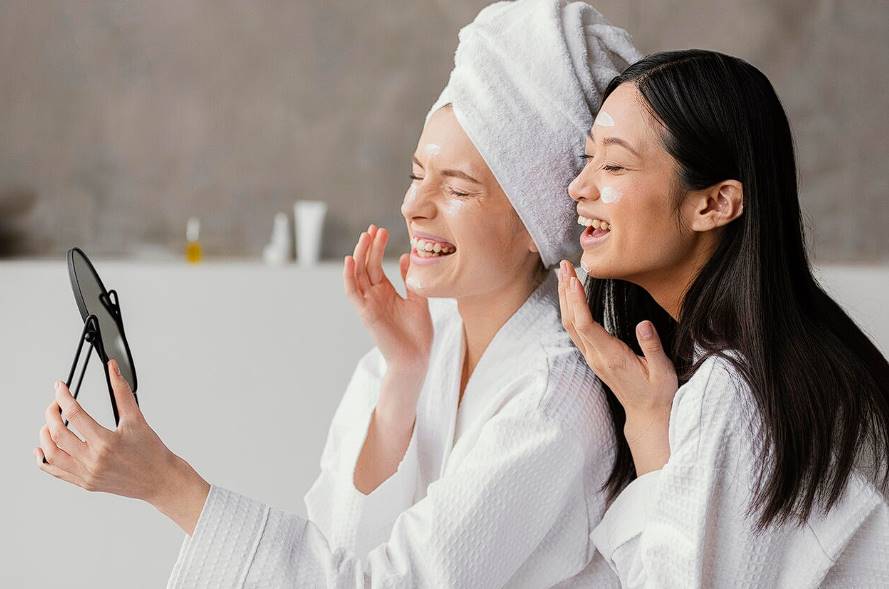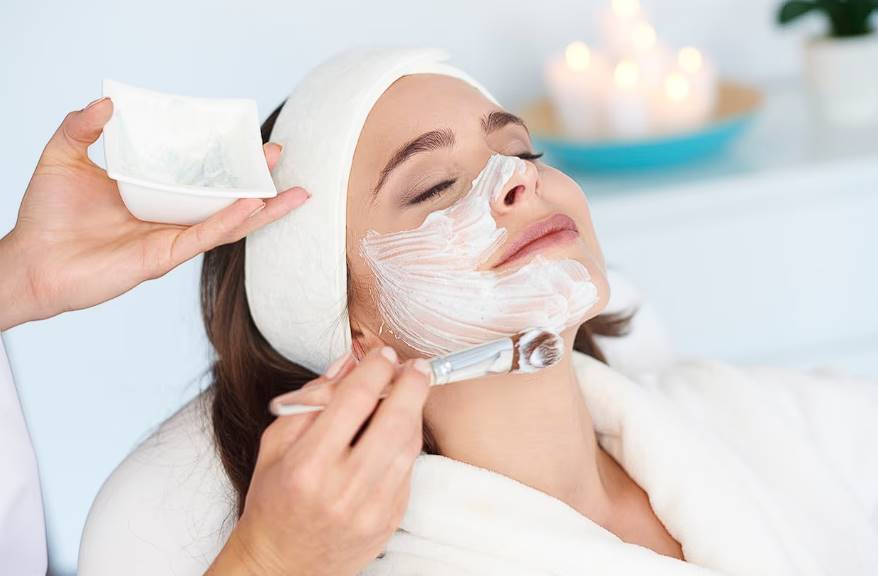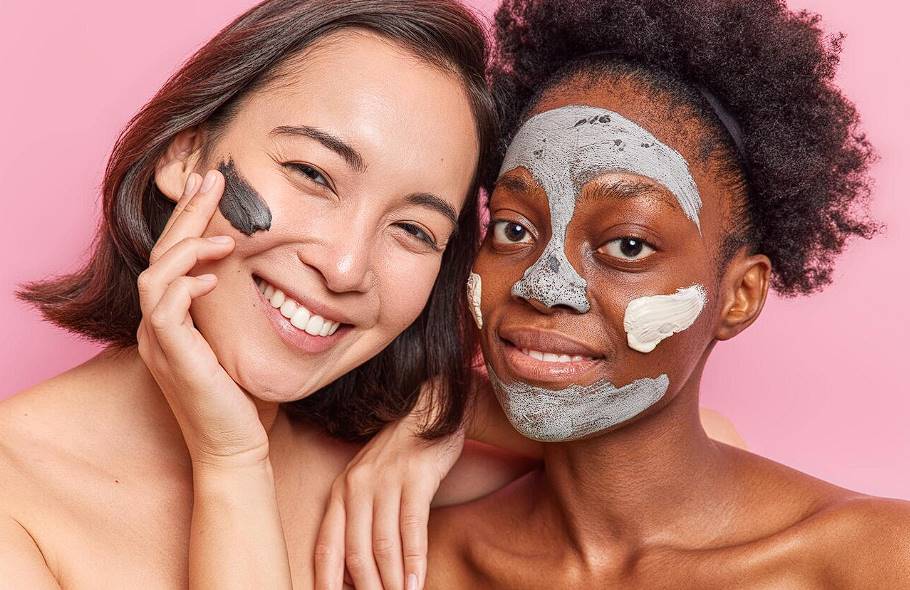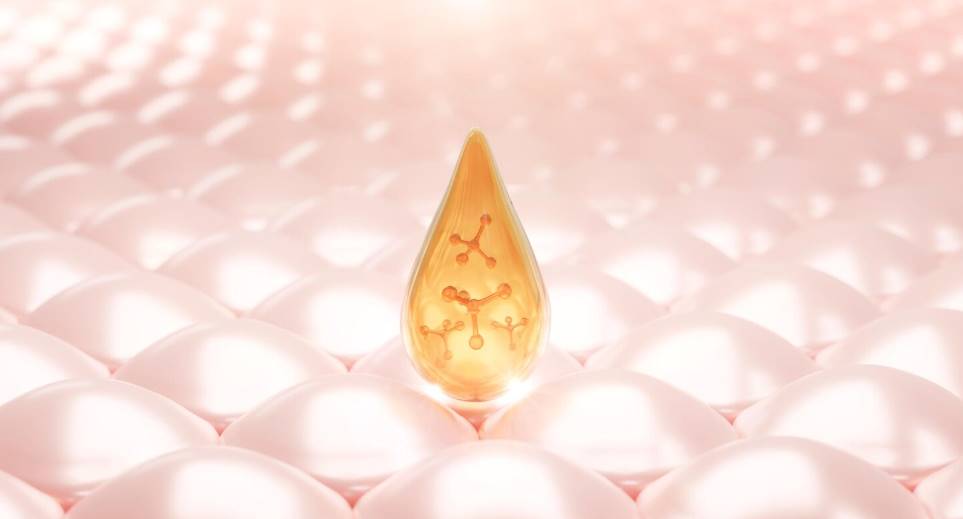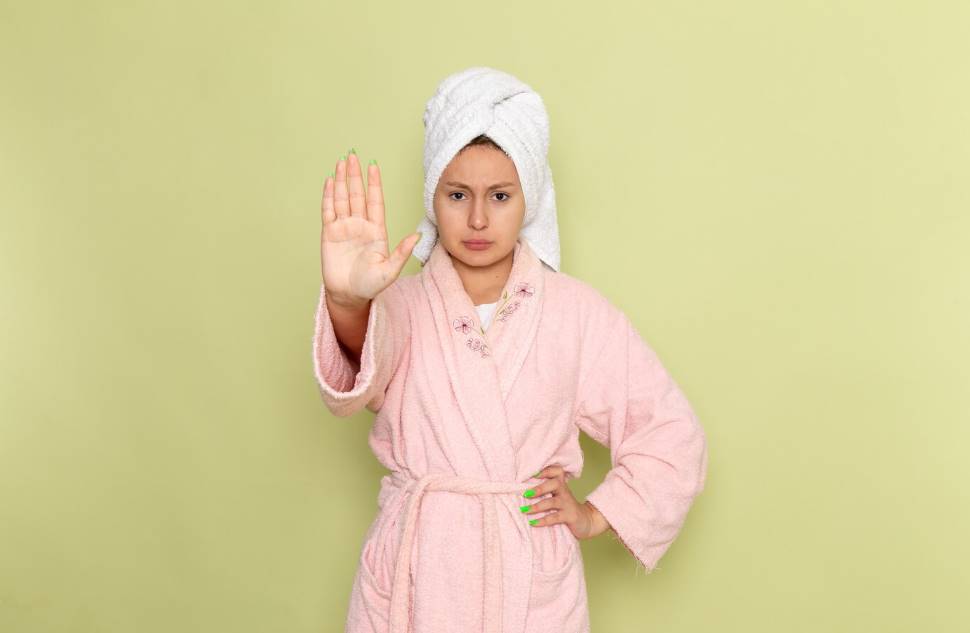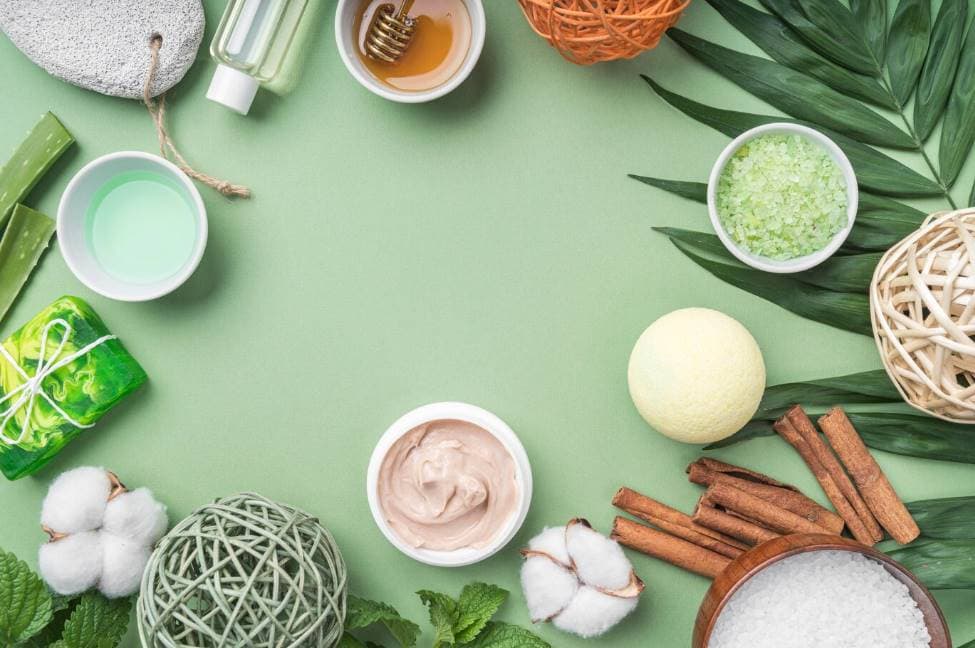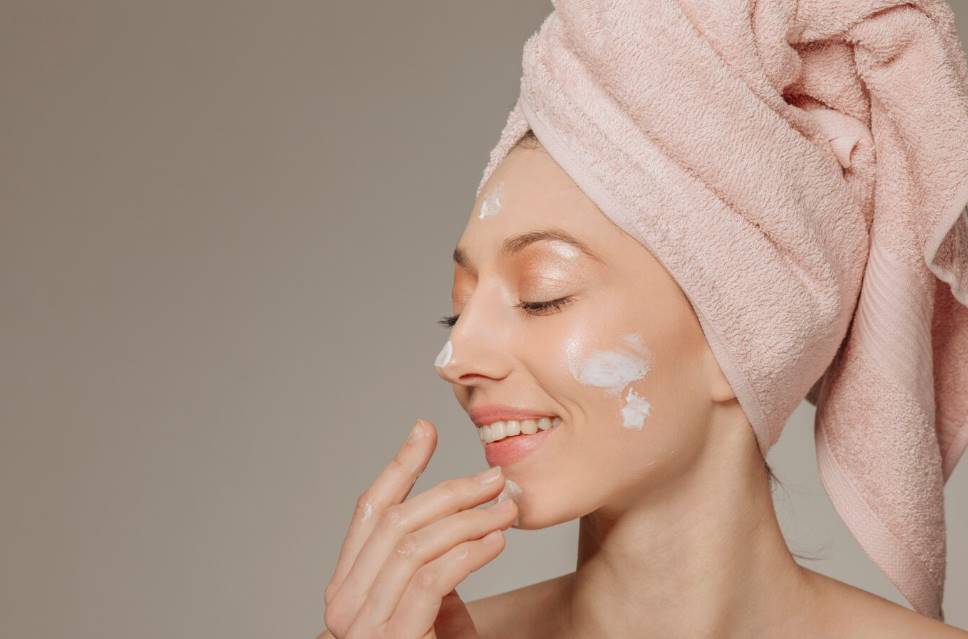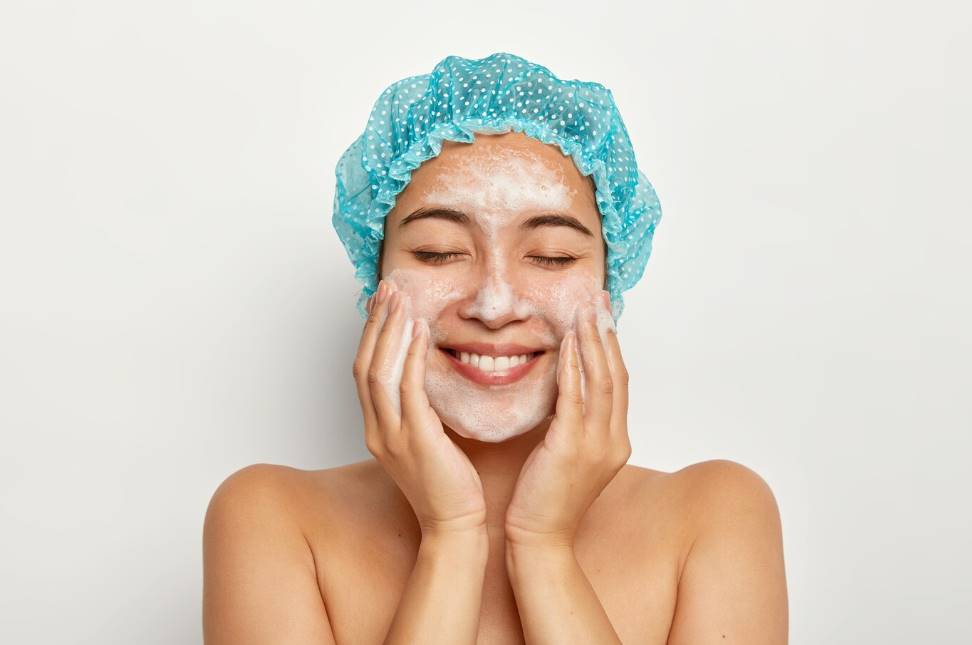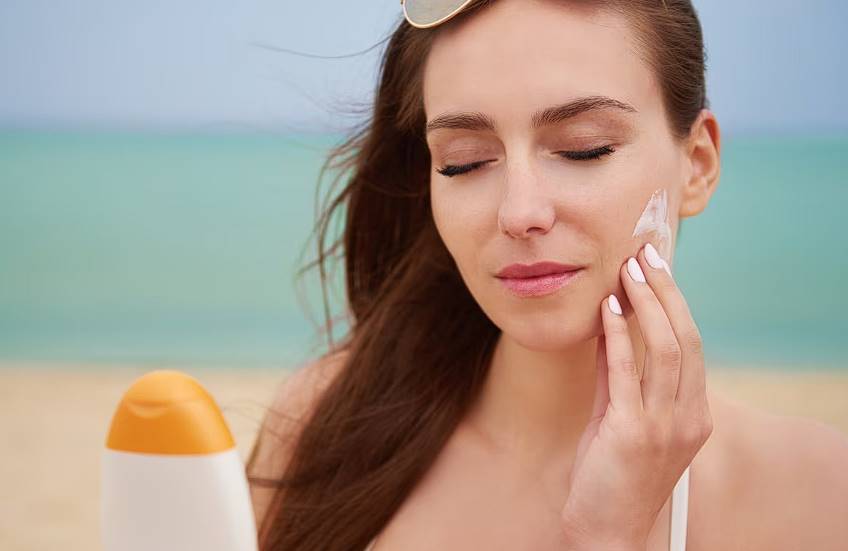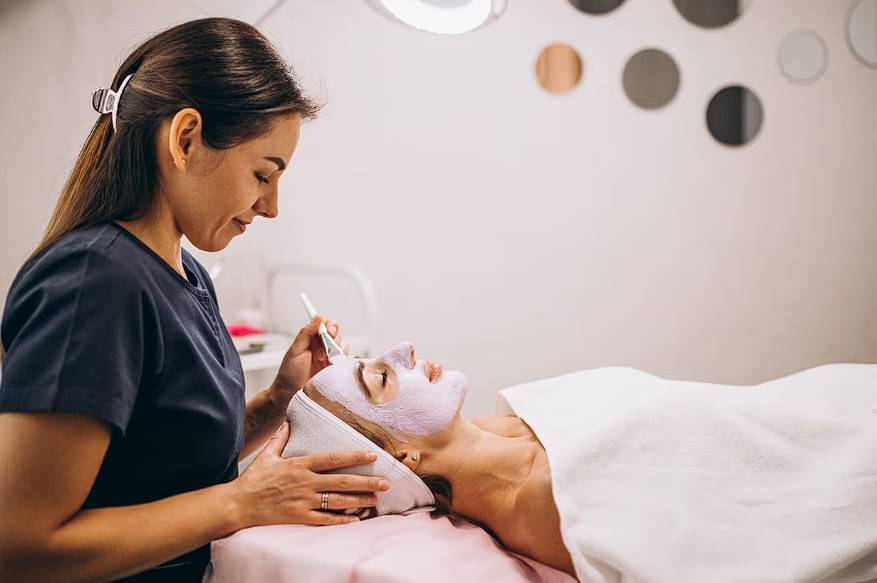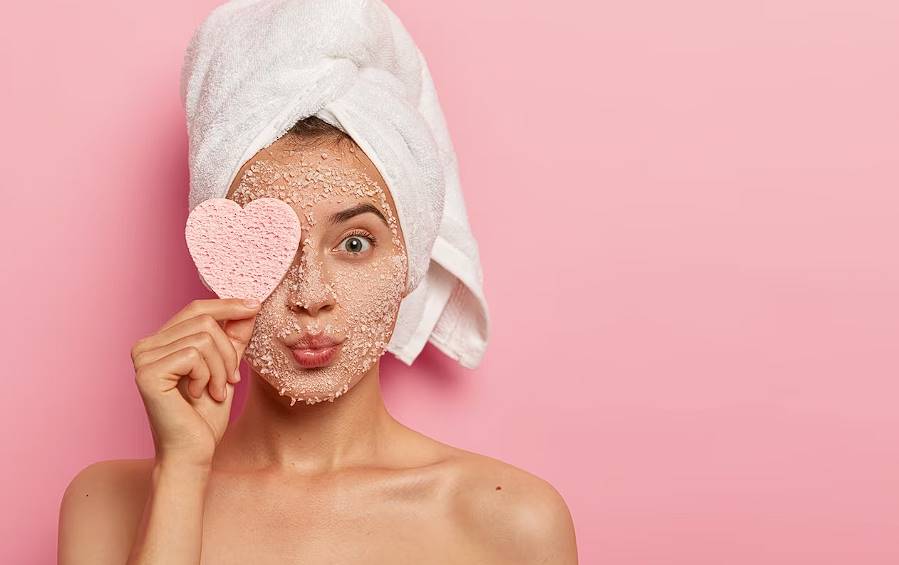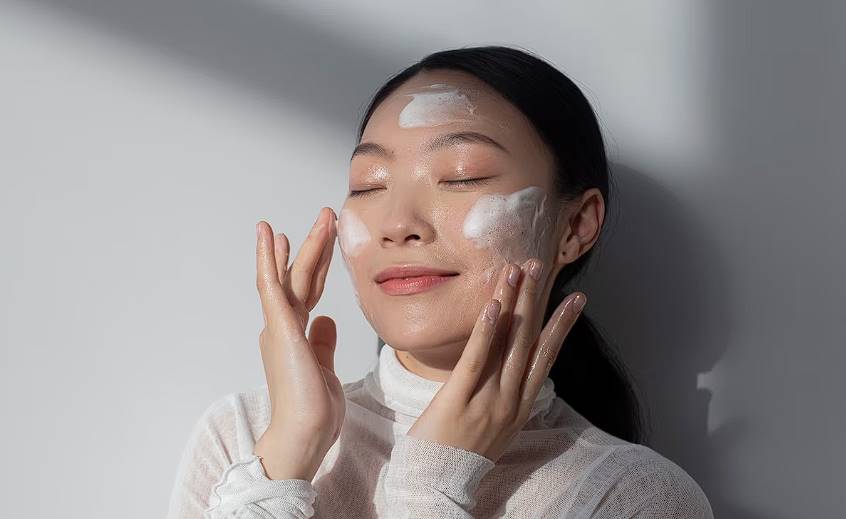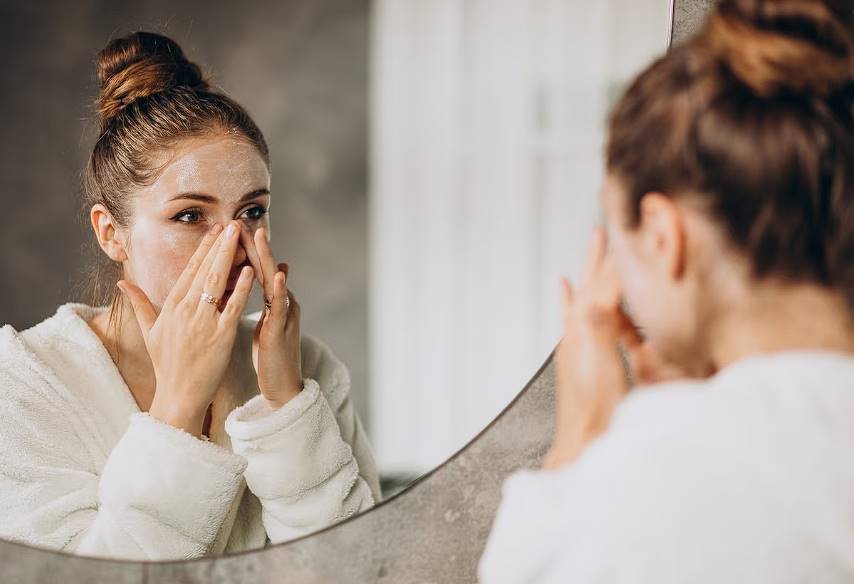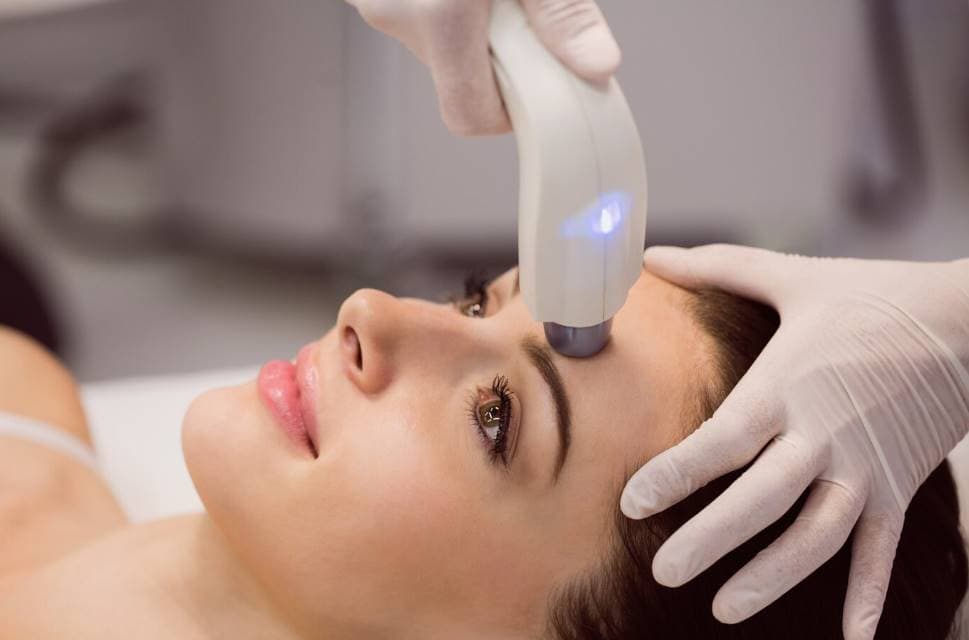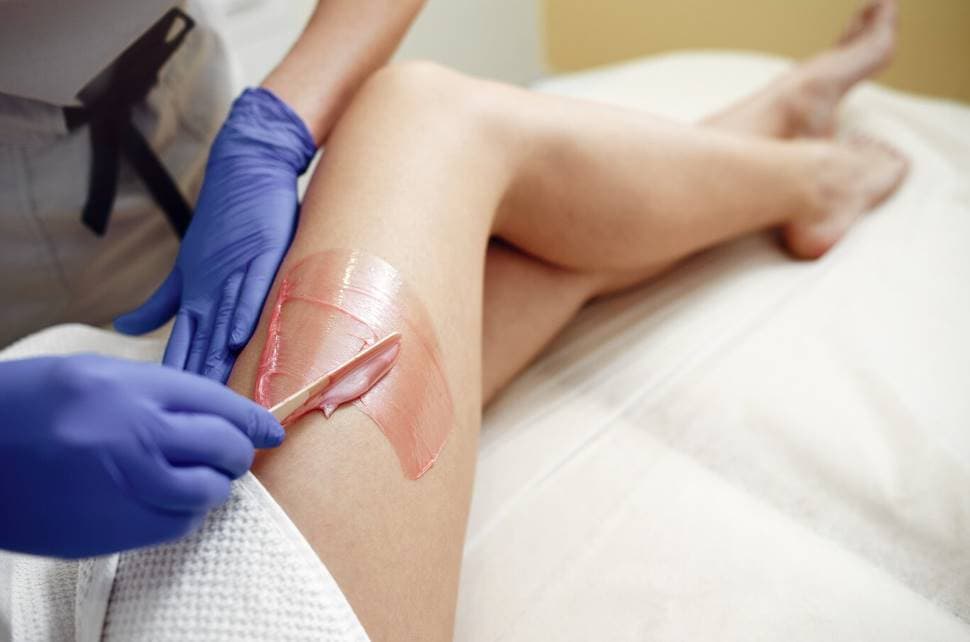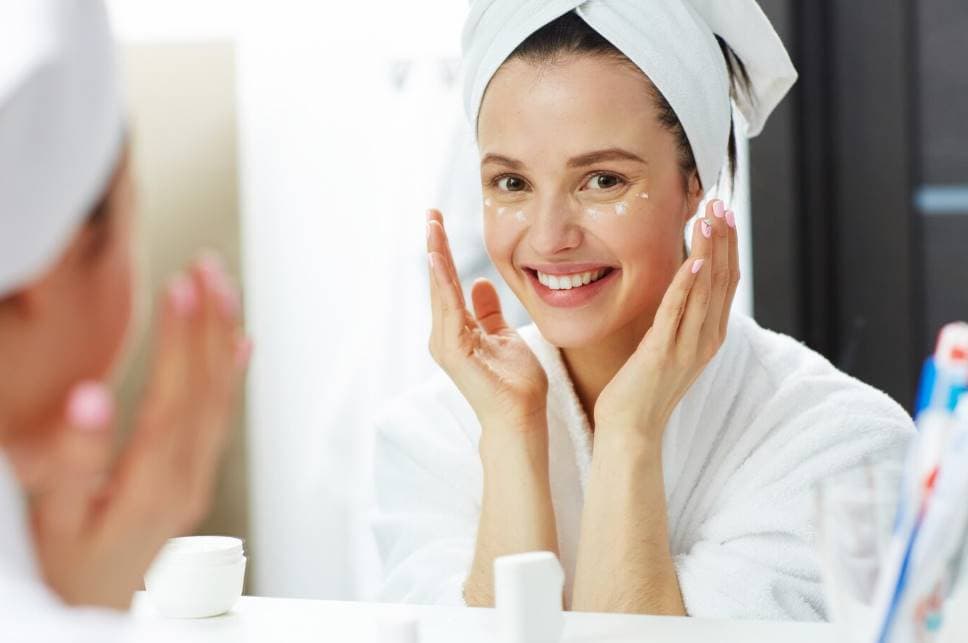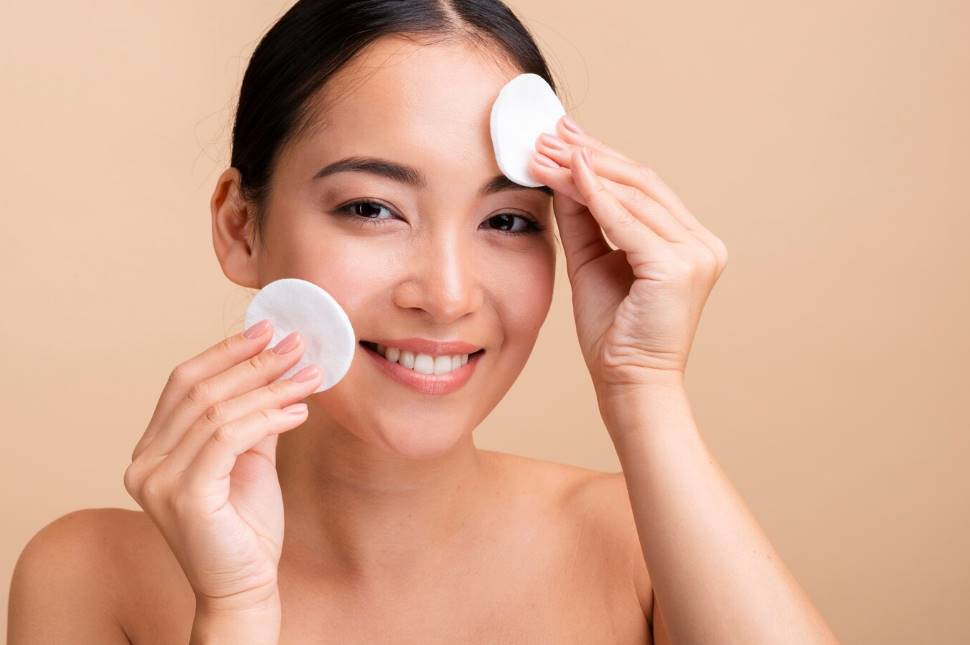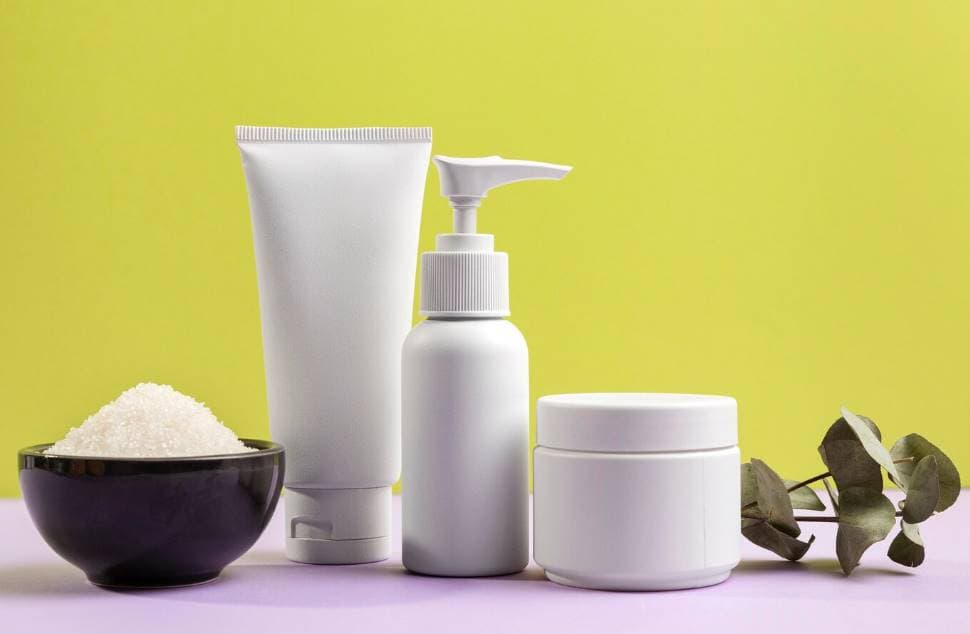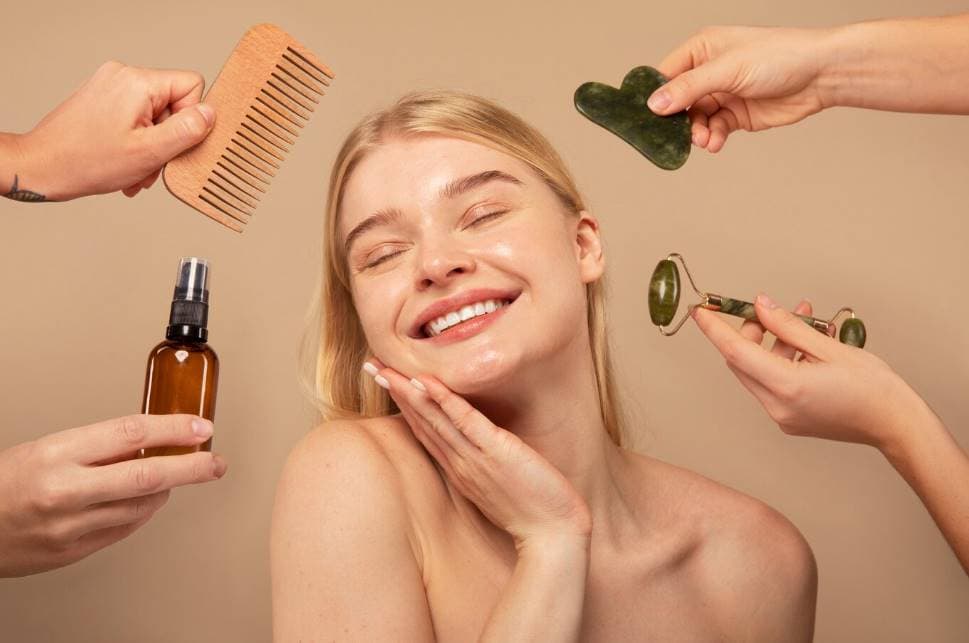To keep your skin healthy and looking good, all you need is a basic skincare routine. Every good skincare routine has the same four pillars at its centre. Cleaning is the initial procedure.
Skin should be cleansed twice daily, in the morning and before bed, to remove the day's grime, pollutants, and makeup. To keep your skin from becoming dry and irritated due to the removal of its natural oils, use a mild cleanser that contains no soap.
When you're done washing your face, the following step is to tone. Toners are used to restore the skin's natural pH level, making it more receptive to subsequent skincare treatments.
Pores are minimised and skin is revitalised by using a toner. To avoid dryness, try to use a toner that contains natural components like camomile or rose water instead of alcohol.
Moisturisers are the third component of a basic skincare routine. No matter what your skin type is, you need to moisturise regularly to maintain your skin supple and healthy. Moisturisers stop your skin from drying out and flaking by resealing the skin's moisture barrier.
Those with oily skin should choose for a lightweight, non-comedogenic moisturiser, while those with dry skin can benefit from a product with a thicker formulation.
Last but not least, sunscreen is an essential part of any skincare routine. Applying sunscreen before going outside can help you avoid sunburn, early skin ageing, and even skin cancer. Choose a broad-spectrum sunscreen with at least an SPF of 30, and apply it liberally, especially on cloudy days, to all areas of exposed skin.
Steps involved in your basic skin care routine?
Basic skin care has more of an impact on your skin's quality than your genetics.
If you've been ignoring your skin for years, give it at least 10 minutes of your time so it can mend and be healthy. Maintaining healthy skin needs time and effort, both in the morning and at night. However, in this fast-paced world, it might be difficult to devote a lot of time to nurturing your skin.
However, experts are increasingly recommending a less complicated, more streamlined approach to skin health. Therefore, think of the adage "fewer steps, more potent ingredients."
But you have some questions before you can begin a thorough skincare routine: Is it necessary to use so many different items on your face? What do you find works best for your skin? What is the recommended sequence for using these items? What are the products supposed to do, anyway? For instant skin advice, check out Derma Essentia's skincare quizzes and acne quiz.
Creating and sticking to a skin care programme can be difficult. Here is a simple three-step skin care programme that will do wonders for your face.
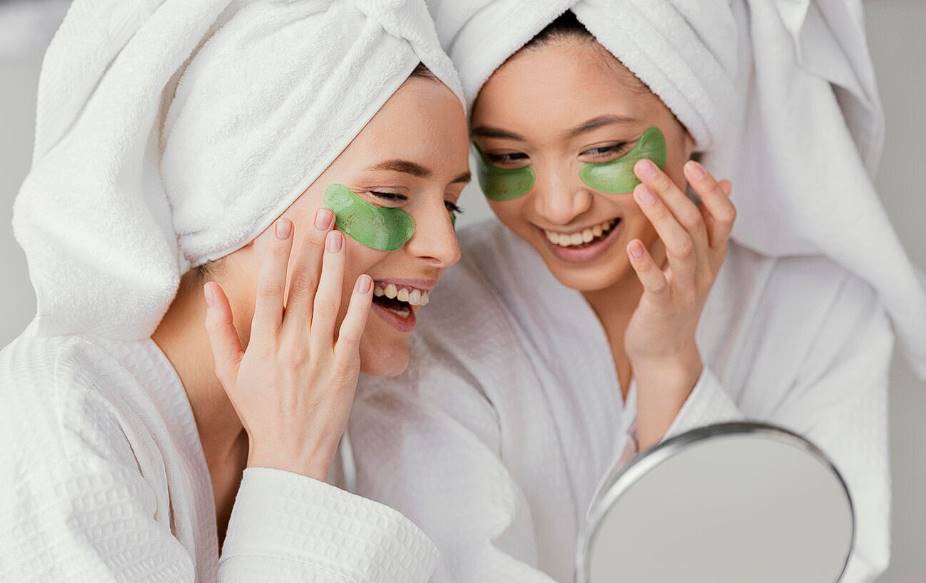
Cleanse first
Start by washing your face with your prefered method; doing so will assist your skin better absorb any subsequent products while also removing any impurities or dead skin cells. The best method of cleansing depends depend on your skin's needs.
If your skin is youthful and healthy, you can exfoliate with just your hands and a gentle cleanser to get rid of dead skin cells. Silicon brushes are included in certain cleansers, and they make for excellent exfoliation and a more thorough cleansing.
Considerations of paramount importance for the purification process
- A mild, moisturising face cleanser is appropriate for all skin types, so novices should choose one of those.
- Look for cleansers that contain ceramides and glycerine to restore the skin's protective barrier and avoid fragrances that could aggravate the skin.
- Face washing twice a day, in the morning and before bed, is recommended.
- Never skip or neglect your nightly skin washing routine. Excess oil, sweat, dead skin cells, pollutants, and other debris from the day, along with the skin care products and cosmetics you used in the morning, can only be removed through a thorough cleansing at the end of the day.
When choosing a cleanser, it's important to think about your skin type.
- Excess oil on the skin can be controlled and removed with the use of a cleanser formulated for oily skin, such as a foaming or gel cleanser. Clogged pores can also be treated with these ingredients.
- Acne-prone skin: In order to effectively treat acne, you should use a moderate foamy cleanser containing acne-fighting chemicals such as glycolic acid, salicylic acid, benzoyl peroxide, or sulphur.
- Cracked heels: If you have dry skin, look for a cleanser with hydrating ingredients like glycerine, ceramides, hyaluronic acid, and herbal oils.
- Having delicate skin: Micellar water, a mild cleanser made from micelles (small particles that catch contaminants and pull them out without drying your face), is worth considering.
Moisturize
Face moisturisers are a close second since they keep your skin hydrated and aid in fortifying its protective barrier. Choose a lightweight, non-pilling daytime moisturiser if your skin is oily or prone to breakouts.
It's up to you to decide whether a thicker composition or a moisturiser is best for your dry skin. Whatever your skin type, it's important to apply a moisturiser year-round to keep your skin hydrated and looking young.
What components make up the ideal skin moisturiser?
- Hyaluronic acid can balance out skin tone, hydrate dry skin, and add volume.
- Ceramides are helpful for those with eczema, dark patches, and very dry skin because they help restore the skin's barrier function.
- Vitamin C contains anti-aging qualities and helps keep the skin looking young and healthy.
Sun protection
No matter your age or skin type, the dermatologists all agree that daily sunscreen use is essential. Sunscreen with a broad spectrum should be worn daily. When reducing your skincare routine, sunscreen should not be eliminated. Why?
Sunscreen protects your skin from environmental hazards, most notably harmful ultraviolet light.
Considerations to make when picking for a sunscreen
- Go with a cream-based formula. Sunscreens in spray or powder form provide a health risk since they can enter the body through the mucous membranes of the eyes, nose, and ears.
- Pick a high SPF (sun protection factor) sunscreen. Protective effects last longer the higher the SPF.
- Look for a sunscreen that can withstand being splashed with water and perspiration. Water resistant sunscreen is not completely watertight, but it will still protect you from the sun more effectively than regular sunscreen.
- Learn the differences between matte, mineral, and regular sunscreens, examine the product's ingredient list, and make an informed decision based on your skin type.
- If you have sensitive skin, you should stay away from aphelia products. To be safe, you should also perform a patch test on the area that sits behind your ear. If there is no reaction, you can keep using the same sunscreen.
- Use an eye cream first if you have a sensitive under-eye area, and then apply sunscreen.
8 Benefits Of A Daily Skincare Routine
You get to start fresh and finish clean
The first step of any good routine is to clean your face (with a mild, all-natural cleanser or toner). Dead skin cells and oil that can clog pores are washed away when you wash your face twice a day.
The nighttime wash also gets rid of potentially damaging environmental contaminants and poisons. It is recommended to double-wash at night: once to remove makeup and dirt gathered throughout the day, and once to clean the skin thoroughly.
Hydration
Hydration is the key to beautiful, healthy skin. Skin that is properly hydrated not only appears and feels better, but is also in better health. The slower skin ageing occurs when skin cells are healthy. We'd all benefit from stopping time, too.
While your skin does have some built-in mechanisms for maintaining hydration, it also loses some moisture as you go about your day. It's already challenging enough for skin to keep itself hydrated without adding the effects of the climate, ageing, and other variables.
Moisture is retained both within the skin and on its surface by using quality skincare products. Hydration is preserved throughout day and night thanks to the oxygen microbubbles in our formulations.
Get the healing powers of oxygen
Skin cells, like all of your other cells, require oxygen. One more reason to have that first glass of water in the morning: drinking water helps keep skin hydrated and may also improve circulation.
In order to take oxygen delivery to the next level, the skin cells in your body will be bathed in oxygen microbubbles from the outside in using our solutions. This results in healthier cells and enhanced metabolic processes.
Reviving tissues with oxygen results in radiant, healthy skin. The scientific findings add up to enhanced tone, lustre, and smoothness.
Achieve improved skin tone
Pollution can make your skin look dull and tired. Discoloration and textural irregularities can be brought on by dryness, pollution, and sunlight. The colour and smoothness of your skin will be altered.
As a result, it's crucial to stay well hydrated and do routine repairs every day. Patches and spots can be avoided with regular upkeep, even if your skin is in excellent condition. If you've noticed a change in your skin's tone or texture, regular upkeep can help restore your skin's suppleness.
Revive dull-looking skin
Dullness is a natural result of having dry, dead skin. Our metabolic rate decreases with ageing. Dullness is a result of slower cellular metabolism. Time, though, is on your side as well: Daily moisturising maintains a dewy, fresh appearance, and applying it twice daily for just three minutes will keep you looking radiant. Truly O2's oxygen microbubble-based compositions make this period more productive and efficient.
This innovation expedites the metabolic rate of epidermal cells by transporting oxygen directly to their sites of need. A higher metabolic rate is associated with the production of fresher, healthier skin cells and a radiant appearance.
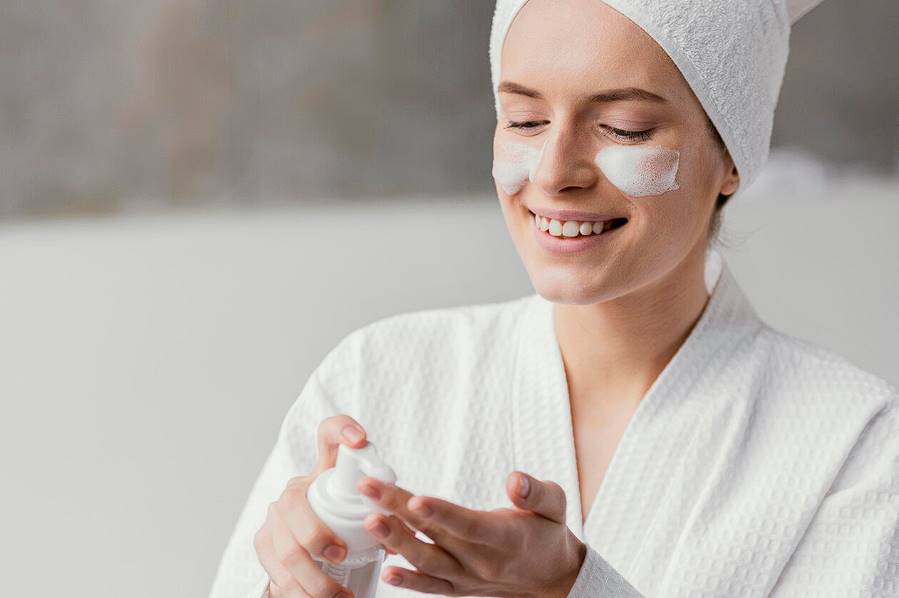
Slow the signs of aging
Each person's narrative is unique, and that's something to be celebrated. We believe you should have some control over the narrative your face portrays. In addition, investing in quality skincare allows you to shape the message sent by your face.
To put it succinctly, consider the houseplants in your home. Drying causes soil to harden and shrink. It detaches from the vessel, solidifies, and breaks open. Soft, pliable, and with a spongy loft when properly hydrated. But even when pliable, it nevertheless provides the necessary framework for plant roots to flourish.
Truly O2 skincare helps your skin maintain its health, firmness, elasticity, and suppleness thanks to the oxygen microbubbles in it. It completely saturates the skin by delivering and retaining moisture at the surface. And less wrinkled, less wrinkly skin is the result.
Please understand that we have nothing against wrinkles. The wrinkles that form as we become older are a testament to our lives, which is something to be celebrated, in our opinion. Just not interested in extending or deepening lines before it's absolutely essential.
Achieve a grounded state through daily ritual
Establishing morning and evening rituals that help us centre ourselves is one of the many positive outcomes of maintaining a regular skincare practise. Positive emotions are largely attributable to our regular routines. Starting and ending the day on a happy note allows us to put our best foot forwards.
And they help us stop worrying about the day just in time to go to bed. If you want to get better sleep at night and get more done during the day, try starting each day with a simple, self-affirming routine (instead of fretting).
Self-care is healthcare
Taking care of one's skin is a form of self-love. We believe that your skin, which endures so much every day, deserves special attention at day's beginning and finish. By prioritising your own health, you show yourself that you are valuable.
It's as easy as washing your face twice a day with a gentle cleanser and using a natural moisturiser. Keeping our skin healthy-looking and feeling good demands a consistent investment of positive energy into the care we give it.
Your skin needs protection from the harmful effects of modern life, including pollution and stress. You still owe it to keep it supple and moisturised even if you neglect to drink water.
You should mature as gracefully as possible, since you deserve it. Put an end to your struggle with tight, dry skin. Do away with the problem of blotchy texture and tone.
And you can finally put an end to the premature ageing that comes from having dry, poorly oxygenated skin. Do what your skin asks for and needs. We welcome your immediate participation.
Conclusion
Cleaning, toning, and sunscreen are the most basic steps in taking care of your face. Clean your face twice a day with a mild cleaner to get rid of dirt, oil, and makeup and to tone your skin to bring back its natural pH level and reduce the size of your pores.
Toners can keep your skin from getting dry by using natural ingredients like rose water or camomile. Moisturisers are important for keeping skin soft and healthy, and they should be used regularly to keep skin from cracking and drying out.
Sun protection is very important for keeping the face safe from environmental threats like UV light. Broad-spectrum sunscreen with at least 30 SPF should be put on all uncovered skin in large amounts, especially on cloudy days.
To make and stick to a skincare plan, wash your face twice a day, before bed and in the morning. To repair the skin's protective barrier, choose a gentle face cleanser with ceramides and glycerine that also moisturises. Stay away from fragrances. It is best to wash your face twice a day, in the morning and before bed.
Think about what kind of skin you have when picking a cleaner, like oily, acne-prone, dry, or sensitive skin. If you have oily skin, use a cleanser that foams or gels. If you have acne-prone skin, use a cleanser that foams but isn't too foamy. If you have dry skin, use a cleanser that moisturises or is made from micelles.
A light, non-pilling daytime moisturiser for oily or acne-prone skin will keep your skin moist all year. Vitamin C keeps the skin looking young and healthy because it slows down the ageing process.
A cream-based recipe and a high SPF (sun protection factor) sunscreen are two options to think about when picking one. Regular sunscreen doesn't work as well as water-resistant sunscreen, and sensitive skin should be tried first. Stay away from aphelia items, and test the area behind your ear with a patch. If the skin under your eyes is sensitive, put on eye cream first, then sunscreen.
To take care of your skin, you should wash your face twice a day: once in the morning to get rid of dead skin cells and oil, and again at night to get rid of harmful chemicals and pollutants in the air.
Skin that looks good and is healthy needs to be well-hydrated, and skin cells that are healthy age the skin more slowly. Oxygen microbubbles in skin care products help keep moisture in the skin all day and night, which leads to better cells and faster metabolism.
Skin that is polluted can look dull and tired, and it can change colour and feel differently. Skin can become more flexible again with regular care. Moisturising your skin every day can make it look younger by bringing oxygen microbubbles in from the outside. This makes your cells better and gives your skin a healthy glow.
By spending money on good skin care, people can change the story of their face and slow down the ageing process. Houseplants, for instance, give plant roots a place to grow. Meanwhile, oxygen microbubbles in Truly O2 makeup help keep skin healthy, firm, elastic, and flexible.
Setting up routines in the morning and evening that help you feel grounded can help you feel better and sleep better. Self-care is health care, and putting skincare first is a sign of love for yourself. To keep your skin healthy and feeling good, you need to protect it from the bad things that happen in modern life, like pollution and worry.
Content Summary
- A basic skincare routine is pivotal for maintaining a healthy complexion.
- The cornerstone of skincare is built on four essential steps.
- Begin with cleansing to eliminate daily pollutants and makeup residues.
- It's advisable to cleanse your skin twice daily, ensuring a fresh canvas.
- Choose a gentle, soap-free cleanser to maintain the skin's natural balance.
- Toning comes next, aiming to restore the skin's natural pH levels.
- A quality toner revitalises the skin and minimises pore appearance.
- Opt for natural-based toners, like camomile or rose water, for hydration.
- Moisturising is a universal step, irrespective of skin type.
- Regularly moisturise to keep skin supple, preventing dryness and flaking.
- Lightweight, non-comedogenic moisturisers are ideal for oily complexions.
- For dry skin, a richer formulation provides the necessary hydration.
- Sunscreen application is paramount in protecting against harmful UV rays.
- Daily sun protection prevents premature ageing and potential skin cancer risks.
- For maximum protection, select sunscreens boasting a minimum SPF of 30.
- Good skincare can have a more significant impact than genetic predispositions.
- Even a 10-minute routine can rejuvenate neglected skin.
- Contemporary skincare approaches advocate "fewer steps, more potent ingredients."
- Experts often ponder the need and effectiveness of myriad skincare products.
- Establishing a regimen can be challenging but yields noticeable results.
- The ideal cleanse considers the unique needs of your skin type.
- For effective cleansing, consider tools like silicone brushes for exfoliation.
- A gentle, moisturising face cleanser is a universal go-to for beginners.
- It's paramount to cleanse both morning and night to maintain skin clarity.
- For oily skin, foaming or gel cleansers can effectively control excess oil.
- Acne-prone individuals might benefit from cleansers with salicylic acid or benzoyl peroxide.
- Dry skin types should seek out cleansers with hydrating ingredients.
- Micellar water is a gentle option for those with sensitive skin.
- After cleansing, moisturising helps fortify the skin's protective barrier.
- Moisturisers with ingredients like hyaluronic acid offer deep hydration.
- Daily sun protection is a non-negotiable step in any skincare routine.
- Opt for cream-based sunscreens for comprehensive skin protection.
- Water-resistant sunscreens offer enhanced protection during sweaty activities.
- For sensitive skin, it's crucial to avoid potentially irritating ingredients.
- Achieve a revitalised start and end to the day with a consistent skincare routine.
- Hydration remains paramount, slowing down the skin ageing process.
- Harness the rejuvenating powers of oxygen for skin cellular health.
- Combat pollution-induced skin challenges with regular skincare maintenance.
- Address skin dullness with products enhancing cellular metabolism.
- By investing in quality skincare, one can control visible signs of ageing.
- Embrace daily rituals, fostering a sense of grounding and well-being.
- Prioritising skincare is a testament to self-care and self-love.
- Simple gestures, like daily cleansing, make a significant impact.
- Pollution, stress, and modern life warrant effective skincare protection.
- Adequate hydration, both internally and externally, combats tight, dry skin.
- Addressing skin issues promptly can prevent premature ageing.
- Daily care, including moisturisation, aids in achieving a consistent skin texture.
- Sunscreen ensures protection from environmental factors and harmful UV damage.
- Invest time in understanding your skin's unique requirements.
- Active participation in your skincare routine reaps lasting benefits.
Frequently Asked Questions
The basic steps of a skincare routine include cleansing, toning, moisturising, and sun protection. Cleansing removes dirt and impurities, toning balances the skin's pH, moisturising keeps the skin hydrated, and using sunscreen protects against UV damage.
To cleanse the skin, start by wetting your face with lukewarm water. Apply a gentle cleanser suitable for your skin type and massage it in a circular motion, focusing on areas prone to oiliness or makeup residue. Rinse thoroughly with water and pat your skin dry with a clean towel.
Toning is essential to balance the skin's pH, tighten pores, and remove any remaining impurities after cleansing. Apply toner to a cotton pad and gently swipe it across your face and neck. Avoid toners containing alcohol, as they can be harsh on the skin. Opt for alcohol-free toners with soothing ingredients like chamomile or rose water.
The moisturiser should be applied after cleansing and toning, preferably while the skin is still slightly damp, to lock in moisture. Take a small amount of moisturiser and gently massage it onto your face and neck using upward and outward motions. Choose a moisturiser suitable for your skin type, whether it's dry, oily, or sensitive.
Sunscreen is crucial because it protects the skin from harmful UV rays, preventing sunburn, premature aging, and the risk of skin cancer. UV rays can penetrate clouds, so even on cloudy days, it's essential to apply sunscreen. Use a broad-spectrum sunscreen with at least SPF 30 and reapply every two hours, especially if you're outdoors.
